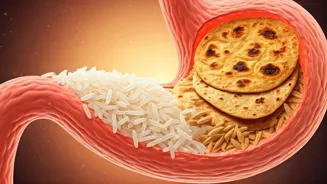Roti's Digestive Profile
Roti, a staple in many Indian households, is primarily composed of whole wheat flour. This means it packs a punch of dietary fiber. Fiber is essential
for healthy digestion, aiding in the smooth movement of food through your digestive tract and preventing constipation. Moreover, roti is often prepared without much oil, making it a relatively light option. It is also a source of complex carbohydrates, which take longer to break down than simple carbs, promoting a feeling of fullness and potentially preventing overeating. However, the gluten content in wheat can pose a challenge for some individuals. Those with gluten sensitivities or celiac disease may experience bloating, gas, and other digestive discomforts after consuming roti. The glycemic index of roti is moderate, meaning it can cause a moderate rise in blood sugar levels. Considering the time of consumption, especially at night, individuals with diabetes or insulin resistance might need to be mindful of their portion sizes.
Rice and Digestion
Rice, another widely consumed grain, comes in various forms, each with distinct effects on digestion. White rice, being highly processed, contains less fiber compared to brown rice, leading to faster digestion. This can sometimes cause a quicker spike in blood sugar levels, particularly in individuals with insulin resistance. Conversely, brown rice offers more fiber and nutrients, thus promoting healthier digestion. The ease of digestion depends on the type of rice. For some, white rice might be perceived as 'lighter' and easier to digest, possibly leading to less bloating. But for others, the fiber content of brown rice can be more beneficial for digestive health and regularity. Rice's glycemic index varies; white rice generally has a higher GI than brown rice. Therefore, it is crucial to consider these factors, especially when choosing rice for an evening meal. The preparation method also matters, with steaming or boiling often being preferred over frying to maintain digestive health.
Nighttime Consumption Impact
The timing of your meal, especially in the evening, plays a significant role in digestion. Eating a heavy meal close to bedtime can strain your digestive system as your body's metabolism slows down during sleep. This can lead to discomfort, indigestion, and potentially disrupt sleep quality. Foods that are difficult to digest, high in fat, or spicy are more likely to cause issues when consumed at night. Therefore, choosing foods that are easily digestible, such as roti or rice (depending on the individual and their dietary needs), can contribute to a more restful night's sleep. For some, the lower fiber content of white rice might make it a better choice at night compared to the high fiber content of brown rice or whole wheat roti. However, considering individual tolerances and overall dietary needs is crucial. A lighter meal, consumed a few hours before bed, is often recommended for optimal digestion and better sleep. This also allows the body to focus on repair and rejuvenation during sleep rather than digestion.
Choosing Dinner Wisely
Making balanced dinner choices involves several considerations for optimal digestion. Prioritize easily digestible foods like lean proteins, cooked vegetables, and whole grains. When deciding between roti and rice, take your individual digestive sensitivities into account. If you find that roti causes bloating or discomfort, opting for a smaller portion of white rice might be better. Conversely, if you prefer brown rice, eating it in moderate portions alongside other easily digestible foods can be a healthy choice. Additionally, portion control is essential. Overeating at dinner, regardless of the food type, can strain your digestive system. Adding a side of cooked vegetables and avoiding excessive fats can help promote healthy digestion. Drinking plenty of water throughout the day and avoiding sugary drinks can also significantly aid in digestion. Paying attention to your body's signals and making informed food choices can greatly improve your overall well-being.














